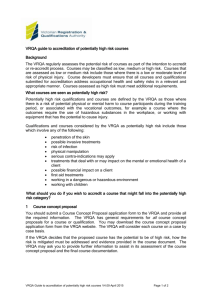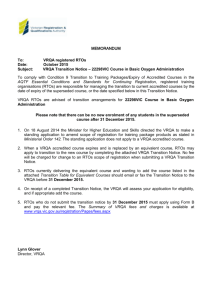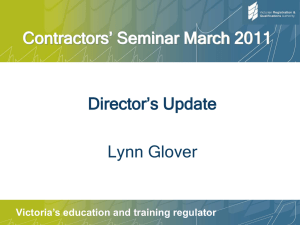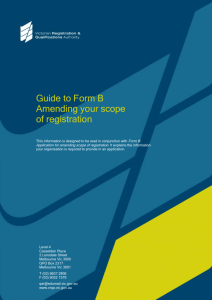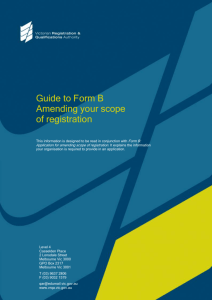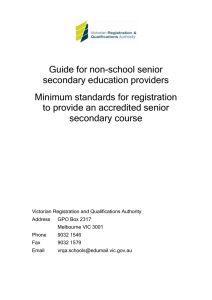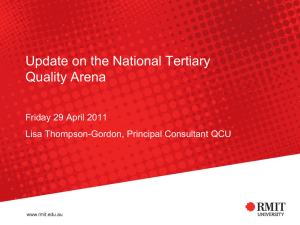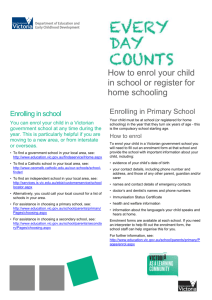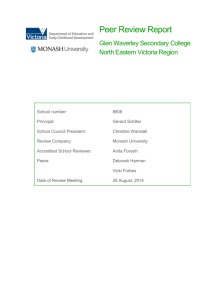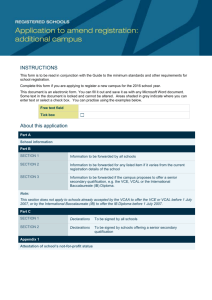July 2014 VRQA Response to the Statements of Expectations (docx
advertisement
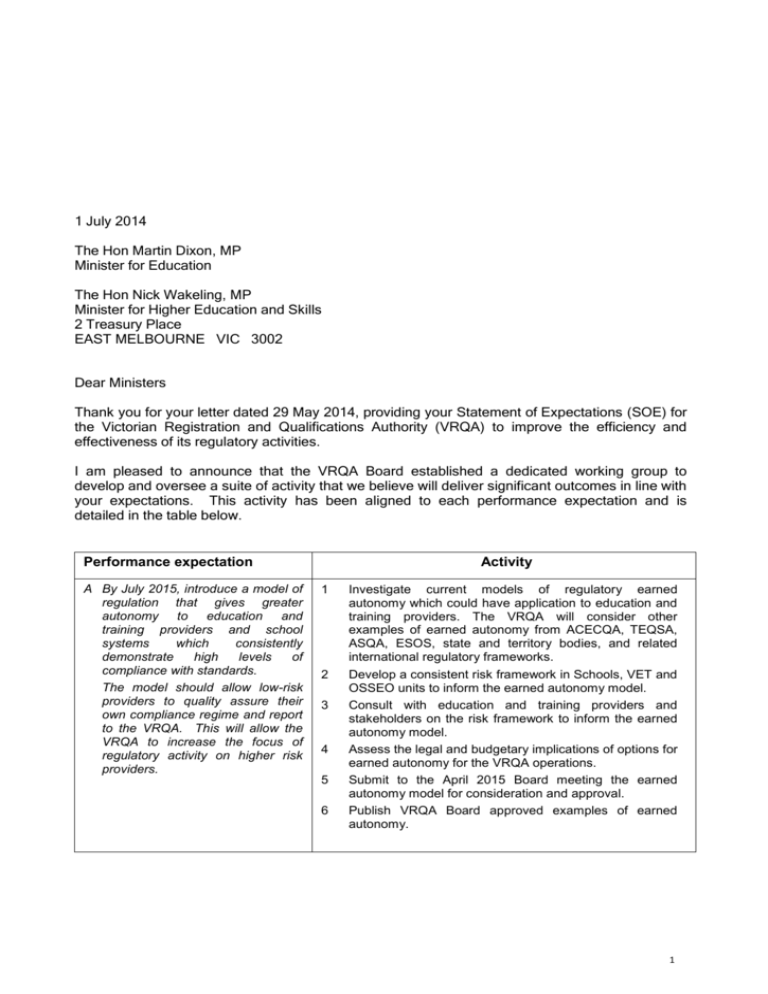
1 July 2014 The Hon Martin Dixon, MP Minister for Education The Hon Nick Wakeling, MP Minister for Higher Education and Skills 2 Treasury Place EAST MELBOURNE VIC 3002 Dear Ministers Thank you for your letter dated 29 May 2014, providing your Statement of Expectations (SOE) for the Victorian Registration and Qualifications Authority (VRQA) to improve the efficiency and effectiveness of its regulatory activities. I am pleased to announce that the VRQA Board established a dedicated working group to develop and oversee a suite of activity that we believe will deliver significant outcomes in line with your expectations. This activity has been aligned to each performance expectation and is detailed in the table below. Performance expectation A By July 2015, introduce a model of regulation that gives greater autonomy to education and training providers and school systems which consistently demonstrate high levels of compliance with standards. The model should allow low-risk providers to quality assure their own compliance regime and report to the VRQA. This will allow the VRQA to increase the focus of regulatory activity on higher risk providers. Activity 1 2 3 4 5 6 Investigate current models of regulatory earned autonomy which could have application to education and training providers. The VRQA will consider other examples of earned autonomy from ACECQA, TEQSA, ASQA, ESOS, state and territory bodies, and related international regulatory frameworks. Develop a consistent risk framework in Schools, VET and OSSEO units to inform the earned autonomy model. Consult with education and training providers and stakeholders on the risk framework to inform the earned autonomy model. Assess the legal and budgetary implications of options for earned autonomy for the VRQA operations. Submit to the April 2015 Board meeting the earned autonomy model for consideration and approval. Publish VRQA Board approved examples of earned autonomy. 1 Performance expectation B Reduce the burden on multi-sector Activity 7 Establish integrated financial assessments for multisector education and training providers so that they undergo one assessment for all registration types. 8 Streamline the risk framework across all registration types. C Continue to advance and protect the interests of students, apprentices, trainees, parents and employers by actively managing and responding to compliance and financial failure risks. By February 2015, the VRQA will identify and publish key risk factors, and monitor providers against these factors in order to mitigate risks to consumers. 9 Report to the February 2015 VRQA Board meeting on the proposed financial risk criteria. Publish the approved financial risk criteria on the VRQA website by March 2015. Provide education and training provider and stakeholder workshops designed to help identify and address financial stress. Establish an annual process to reassess the continued relevance of the financial risk framework. Where high risk is identified, take appropriate action. D Further improve the transparency 14 providers by streamlining regulatory processes. By July 2015, the VRQA will establish single, streamlined processes that can apply to all registration types of a provider, rather than separate processes for each registration type, where it is practical to do so. of the VRQA’s regulatory processes and support education and training providers to reduce non-compliance. By December 2014, the VRQA will make available information and advice regarding the full range of its regulatory activities, and to ensure its published formal complaints policy includes responding to complaints made about the VRQA and its staff. This will be provided in readily accessible formats. 10 11 12 13 15 16 17 E Deepen engagement with education and training providers, employers and other stakeholders to inform the ongoing improvement of regulatory activities. By December 2014, the VRQA will publish a stakeholder engagement strategy that commits to consulting with stakeholders on industry trends and seeks their feedback on the VRQA’s processes. 18 19 20 Review the VRQA website to strengthen accessibility, usefulness and currency of information for education and training providers and stakeholders, with a view to improving on line access for business transactions and registration activity. Review the range of VRQA communication tools for effectiveness, for example VRQA e-news. Review and improve the range of targeted workshops, clinics and seminars to ensure organisations, stakeholders and education and training providers understand VRQA regulatory processes, the roles and responsibilities of all parties, and common problems, and the VRQA understands the changing needs of business and the community throughout the regulatory cycle. Publish the update of the whole of VRQA complaints process including policies and procedures and how the VRQA will respond to these matters. Develop and publish the stakeholder engagement strategy which will include how the VRQA will collect information from stakeholders on emerging industry trends. Expand the VRQA annual stakeholder survey to gather feedback on VRQA processes, and seek feedback from stakeholders, education and training providers, apprentices and trainees, and employers on the range of services that they need from the VRQA. Based on feedback provided, review and update the range of services provided by the VRQA. 2 Performance expectation F Promote greater cooperation, information sharing, regulatory coherence and efficiency with other regulators and key partners. By July 2015, the VRQA will establish and publish memoranda of understanding or other formal arrangements to streamline processes and share information. Activity 21 22 G By January 2016 the VRQA, in collaboration with the Department of Education and Early Childhood Development, will develop a secure register of apprentices and trainees that meets the requirements of the Education and Training Reform Act 2006 and improves the ability of the VRQA and the Department to monitor and analyse industry trends. This will implement the recommendations of the Victorian Auditor General’s Office in its audit of Apprenticeship and Traineeship Completion, published in March 2014. 23 24 Establish and publish memoranda of understanding, or other formal arrangements, to streamline processes and share information with other regulators including the: Victorian Institute of Teaching with respect to the coordination of regulatory activity; The Department of Education and Early Childhood Development with respect to the Department’s role as a school review body, as the regulatory authority for education and care services, and as the responsible Department for providing policy advice to Ministers about education, early childhood development, children’s services, higher education and training in Victoria; and Commonwealth Government and/or other federal agencies where the cooperative approach has been reciprocated with respect to the coordination of regulatory activity. Undertake a stocktake of data collection requirements for ACFE providers with a view to identifying opportunities to reduce duplication and so reduce regulatory burden on providers. Secure funding for the business case for the development of the register. Redevelop in collaboration with the Department of Education and Early Childhood Development a secure register of apprentices and trainees. At its recent Planning Day, the VRQA Board discussed at length the opportunities associated with the SOE and the integration of deliverables into the VRQA’s new Strategic Plan for 2014-16. The SOE has been published on the VRQA website and will be included in our forthcoming Annual Report to Parliament. As you have requested, the VRQA will report on key milestones against deliverables in the Statement. The Board looks forward to working with you as we continue to deliver on your expectations. Yours sincerely Timothy F Smith Chair, VRQA 3
